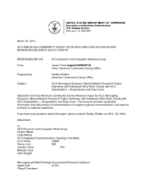ACS Messaging Research: Mental Models Research Project
ACS Messaging Research: Mental Models Research Project
The U.S. Census Bureau's American Community Survey (ACS), an ongoing survey of 3.5 million households each year, is one of our nation's most important information-gathering tools. Data collected through this survey provide a comprehensive picture of the residents in the United States, and the places and the economy in which they live. The ACS boasts an impressive 97.6 percent response rate and is one of the largest data collection efforts conducted by the Census Bureau (CB), and is the successor to the long form of the decennial census.
ACS data have a tremendous impact on our lives. These data inform and drive decisions about improvements to roads and public transportation systems, ways to support schools and hospitals, economic growth strategies to create jobs in a given city, areas where emergency services are needed, tactics for helping a community recovering from a disaster, and much more.
Despite the many practical uses of data collected through the ACS, many respondents are not aware of the survey or its value, and other respondents are opposed to completing the survey because they find the questions intrusive or burdensome. This lack of awareness of and resistance to the ACS presents challenges for conducting and maximizing its use and thus its impact and benefit to the nation. Many people who could use ACS data to improve their businesses and organizations may not know what is available to them and how to use it.
Others in Series
Working Paper
Working Paper
Working Paper




